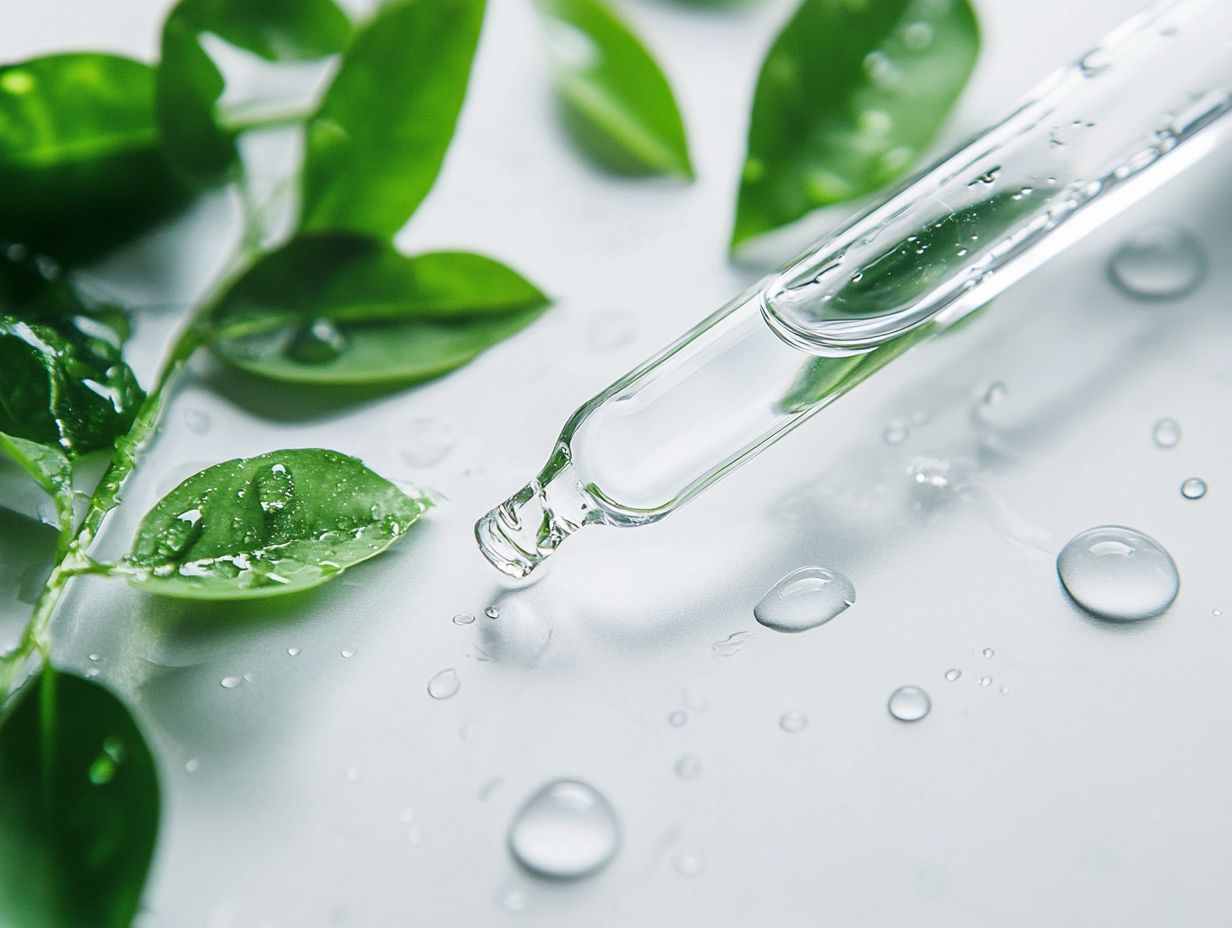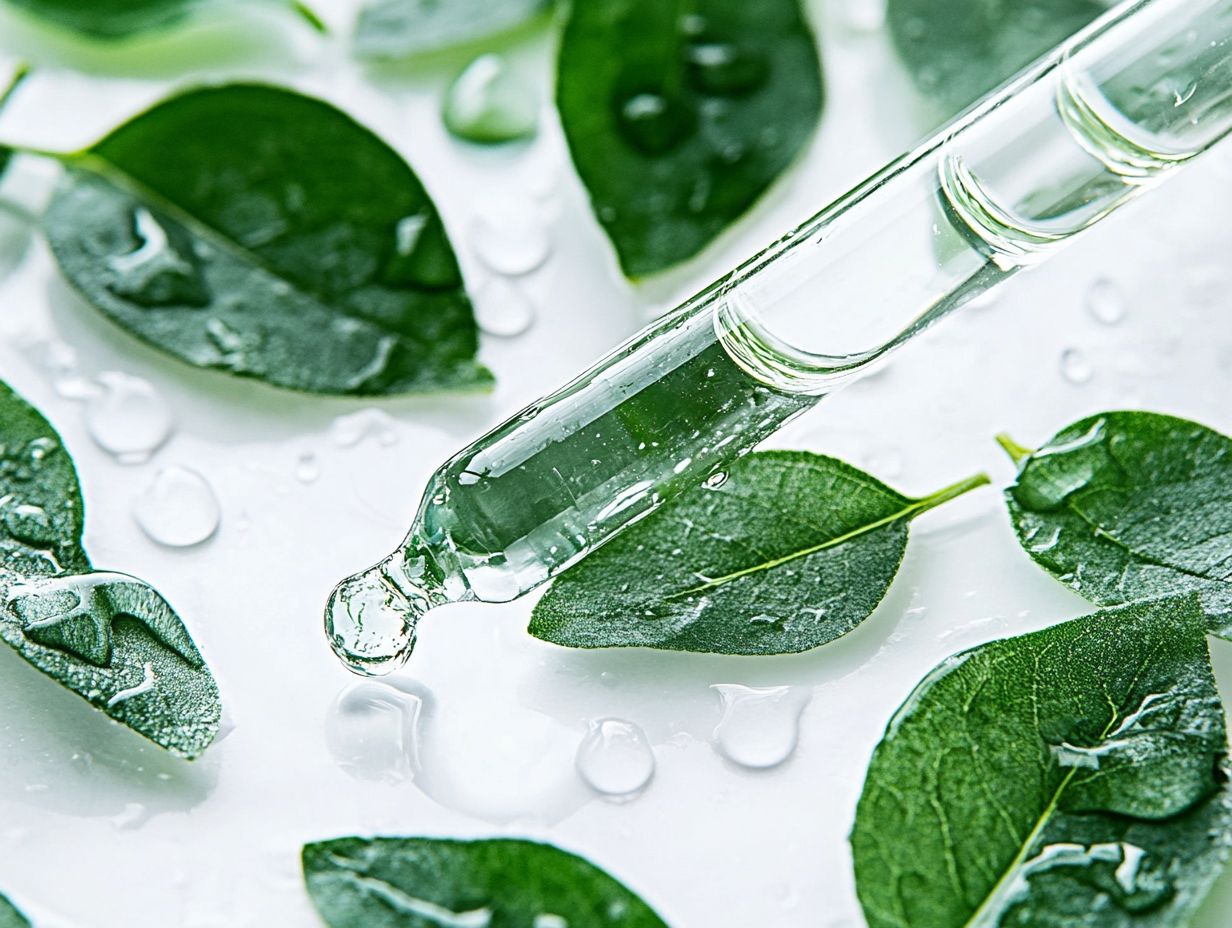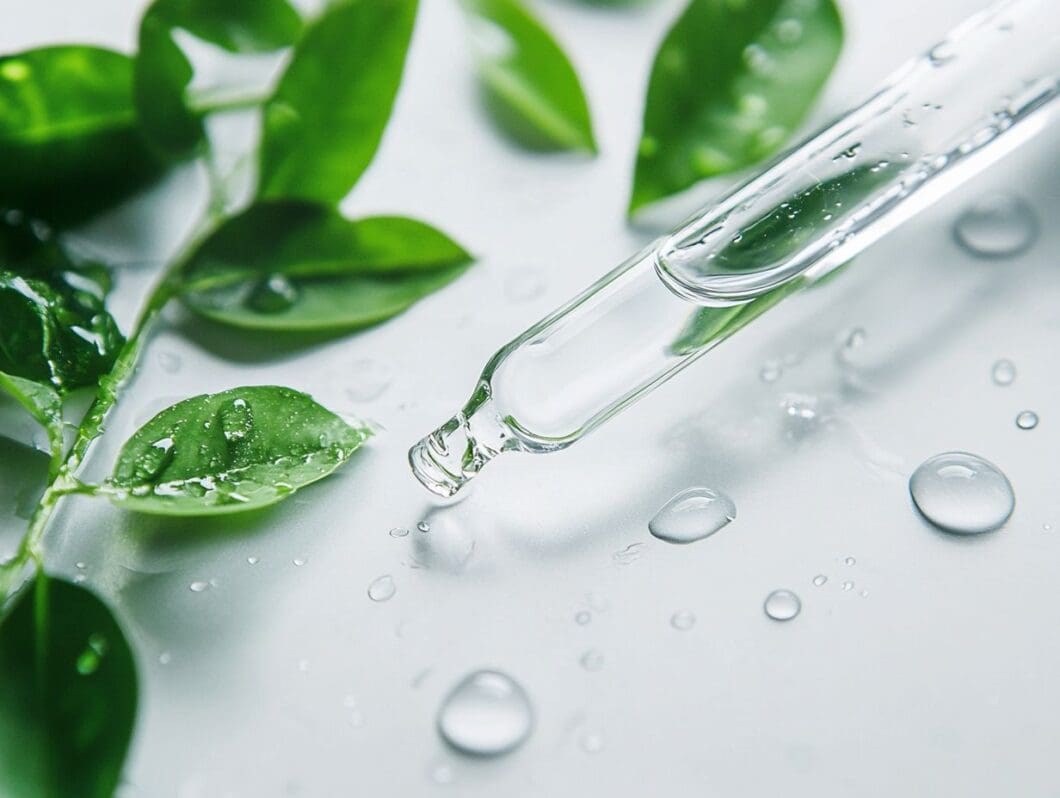Hyaluronic acid has emerged as a skincare superstar, renowned for its incredible ability to hydrate and rejuvenate the skin. This naturally occurring substance not only enhances skin health but also offers a range of benefits, from plumping fine lines to promoting overall radiance.
This article explores what hyaluronic acid is, its various benefits, and how to incorporate it into your routine. It also covers safety, potential side effects, and tips for choosing the right product for your needs.
Dive in to discover how this hydration hero can transform your skincare regimen!
Key Takeaways:

What is Hyaluronic Acid?
Hyaluronic Acid is a naturally occurring substance within the skin that serves as a moisture retention agent, providing intense hydration and contributing to skin plumpness. As such, it has become a preferred ingredient among skincare enthusiasts. This powerful compound is renowned for its capacity to retain up to 1000 times its weight in water, thereby playing a vital role in maintaining skin texture and overall health.
The unique chemical structure of Hyaluronic Acid, characterized by a linear polysaccharide chain, enables it to penetrate various layers of the skin effectively, addressing concerns such as fine lines and dryness. In the beauty industry, this exceptional hydrating agent is frequently included in serums, moisturizers, and masks, facilitating a targeted approach to mitigate signs of aging while enhancing skin elasticity.
Users often report a noticeable improvement in their overall complexion, as Hyaluronic Acid not only provides hydration but also aids in restoring the skin’s youthful resilience. Consequently, it has become a fundamental component for individuals seeking a radiant and revitalized appearance.
Benefits of Hyaluronic Acid

The advantages of Hyaluronic Acid extend well beyond basic hydration; it has established itself as a fundamental ingredient in numerous skincare products designed to enhance skin health and achieve a youthful appearance.
Its remarkable moisture retention capabilities not only serve to plump the skin but also effectively address fine lines and wrinkles, rendering it an essential element in anti-aging formulations.
Improving Hydration and Skin Health
Hyaluronic Acid plays a crucial role in enhancing hydration and overall skin health by functioning as a moisture magnet, which helps maintain optimal moisture levels in the skin. This makes it particularly essential for individuals with dehydrated skin.
Its lightweight texture facilitates easy absorption, thereby enhancing the skin’s natural hydration process and supporting the integrity of the skin barrier.
When combined with other botanical ingredients such as aloe vera, chamomile, or green tea, the moisture-retaining capabilities of hyaluronic acid are significantly enhanced, creating a synergistic effect that contributes to overall skin vitality.
For those facing daily environmental stressors, incorporating a formulation rich in both hyaluronic acid and these plant-based components not only rejuvenates the skin but also fortifies it against dryness. This collaborative approach is essential for restoring skin plumpness and achieving a radiant, dewy complexion, making it an integral part of any daily skincare regimen.
Other Potential Benefits

Hyaluronic Acid serves a primary function in hydration, but it also offers several additional potential benefits. Its antioxidant properties assist in combating environmental aggressors and enhancing skin elasticity, making it a favored ingredient among skincare enthusiasts. The multifunctionality of Hyaluronic Acid enables it to address various skin conditions and contribute to a more youthful appearance.
Notably, Hyaluronic Acid exhibits remarkable soothing effects, effectively calming irritated skin and reducing redness, which makes it especially suitable for individuals with sensitive skin.
Incorporating this powerful ingredient into a comprehensive skincare routine not only improves overall skin health but also promotes a smoother texture. When used in conjunction with Vitamin C, this effective combination brightens the complexion, while CoQ10 helps combat oxidative stress, thereby amplifying the rejuvenating benefits.
Such synergistic combinations exemplify the versatility of Hyaluronic Acid, allowing individuals to customize their skincare regimen to achieve optimal results and a radiant glow.
How to Use Hyaluronic Acid
Understanding the effective use of Hyaluronic Acid can greatly improve one’s skincare regimen, whether through topical applications or oral supplements.
When applied topically, it is crucial to utilize the product correctly to ensure optimal serum application, thereby achieving a significant boost in hydration while effectively layering with other moisturizing ingredients.
Topical Application vs. Oral Supplements

In the administration of Hyaluronic Acid, skincare enthusiasts frequently engage in discussions regarding the merits of topical applications versus oral supplements, as each presents distinct advantages and levels of efficacy. Topical products, such as serums and moisturizers, are known to deliver immediate hydration, while oral supplements may contribute to long-term skin plumpness and overall health from within.
Topical applications often yield prompt results by directly hydrating the outermost layers of the skin; however, they may be less effective in penetrating deeper skin layers. Conversely, oral supplements possess the potential to enhance overall hydration and support skin elasticity from the inside, although the effects may take longer to manifest.
Recent research indicates that users of topical Hyaluronic Acid experienced increased skin moisture levels within a matter of days, whereas individuals taking oral supplements reported gradual improvements over the course of several weeks.
When deciding on the appropriate method, individuals should evaluate their specific skin concerns, whether related to surface dryness or deeper hydration needs, and consider how these options integrate into a comprehensive skincare regimen that also emphasizes sun protection and the use of antioxidants.
Incorporating either or both forms of Hyaluronic Acid can facilitate a holistic approach to achieving healthier, more radiant skin.
Safety and Side Effects of Hyaluronic Acid
Hyaluronic Acid is commonly acknowledged as safe for a variety of skin types, including sensitive skin. However, it is essential for individuals interested in skincare to understand its potential risks and side effects.
This awareness enables users to incorporate this powerful hydrating agent into their skincare routines effectively, minimizing the risk of adverse reactions.
Potential Risks and Precautions
While the potential risks associated with Hyaluronic Acid are minimal, it is essential for skincare enthusiasts to be aware of possible side effects, such as redness or irritation, particularly in individuals with pre-existing skin conditions. Taking appropriate precautions can facilitate the safe enjoyment of the benefits provided by this moisturizing ingredient.
For example, when Hyaluronic Acid is combined with potent actives such as retinol or vitamin C, users may experience heightened sensitivity or adverse reactions. Additionally, individuals using products with high concentrations of Hyaluronic Acid could encounter an over-hydration effect, which may lead to breakouts or a temporary sensation of tightness.
To mitigate these risks, it is advisable for users to perform patch tests prior to full application, introduce new products gradually, and consider diluting concentrated formulations. Maintaining a balanced skincare routine that does not overload the skin with multiple active ingredients simultaneously can help ensure a more comfortable and beneficial experience.
Choosing the Right Hyaluronic Acid Product
Selecting the appropriate Hyaluronic Acid product is crucial for optimizing its benefits, as a variety of formulations are available in the beauty industry, each designed to address specific skin conditions and needs.
Important factors to consider when making a purchase include the product’s absorption capabilities, its concentration, and the inclusion of complementary moisturizing ingredients.
Factors to Consider When Purchasing
When purchasing Hyaluronic Acid products, it is essential to consider several factors, including the formulation type, texture, and additional moisturizing ingredients, to ensure compatibility with one’s skin type. A lightweight texture is often preferred due to its ease of absorption and effectiveness in providing hydration.
Understanding the distinctions between serums and creams is crucial; serums typically contain higher concentrations of Hyaluronic Acid, rendering them more potent options for targeted hydration, whereas creams may provide a thicker barrier to retain moisture.
It is important to evaluate the concentration of Hyaluronic Acid in the selected products, as higher concentrations can yield more intense hydration but may not be suitable for all skin types.
Aligning products with individual skincare goals is essential to effectively address specific concerns, such as dryness or fine lines.
Prioritizing product reviews can provide valuable insights into the performance of various formulations, particularly for individuals with sensitive skin, thereby guiding informed decisions that minimize the risk of irritation while maximizing results.


